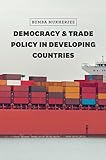Democracy and trade policy in developing countries / Bumba Mukherjee.
Material type: TextSeries: Chicago series on international and domestic institutions: Publisher: Chicago ; London : The University of Chicago Press, 2016Description: viii, 315 pages : illustrations ; 24 cmContent type: text Media type: unmediated Carrier type: volumeISBN: 9780226358789; 022635878X; 9780226358819; 022635881XSubject(s): Protectionism -- Political aspects -- Developing countries | Protectionism -- Political aspects -- Developing countries -- Mathematical models | Democratization -- Economic aspects -- Developing countries | Developing countries -- Commercial policy | Demokratie | Handelspolitik | EntwicklungsländerDDC classification: 382/.73091724 LOC classification: HF2580.9 | .M85 2016
TextSeries: Chicago series on international and domestic institutions: Publisher: Chicago ; London : The University of Chicago Press, 2016Description: viii, 315 pages : illustrations ; 24 cmContent type: text Media type: unmediated Carrier type: volumeISBN: 9780226358789; 022635878X; 9780226358819; 022635881XSubject(s): Protectionism -- Political aspects -- Developing countries | Protectionism -- Political aspects -- Developing countries -- Mathematical models | Democratization -- Economic aspects -- Developing countries | Developing countries -- Commercial policy | Demokratie | Handelspolitik | EntwicklungsländerDDC classification: 382/.73091724 LOC classification: HF2580.9 | .M85 2016| Item type | Current library | Call number | Copy number | Status | Notes | Date due | Barcode |
|---|---|---|---|---|---|---|---|
 Books
Books
|
Female Library | HF2580.9 .M85 2016 (Browse shelf (Opens below)) | 1 | Available | STACKS | 51952000229247 | |
 Books
Books
|
Main Library | HF2580.9 .M85 2016 (Browse shelf (Opens below)) | 1 | Available | STACKS | 51952000229230 |
Democracy and trade policy in developing countries -- Trade protection and electoral malpractice in new democratic regimes -- Trade protection and electoral fraud in new democracies: the empirical evidence -- Political particularism and trade policy in developing democracies -- Empirical tests for political particularism, trade protection, and contributions -- Democracy, political particularism, and trade liberalization in Brazil -- Trade politics and contributions in India and South Africa -- Conclusion.
"Since the 1970s, two major trends have emerged among developing countries: the rise of new democracies and the rush to free trade. For some, the confluence of these events suggests that a free-market economy complements a fledgling democracy. Others argue that the two are inherently incompatible and that exposure to economic globalization actually jeopardizes new democracies. Which view is correct? Bumba Mukherjee argues that the reality of how democracy and trade policy unravel in developing countries is more nuanced than either account. Mukherjee offers the first comprehensive cross-national framework for identifying the specific economic conditions that influence trade policy in developing countries. Laying out the causes of variation in trade policy in four developing or recently developed countries--Brazil, India, Indonesia, and South Africa--he argues persuasively that changing political interactions among parties, party leaders, and the labor market are often key to trade policy outcome. For instance, if workers are in a position to benefit from opening up to trade, party leaders in turn support trade reforms by decreasing tariffs and other trade barriers. At a time when discussions about the stability of new democracies are at the forefront, Democracy and Trade Policy in Developing Countries provides invaluable insight into the conditions needed for a democracy to survive in the developing world in the context of globalization." -- Publisher's description
Includes bibliographical references (pages 279-311) and index.
1 2

There are no comments on this title.